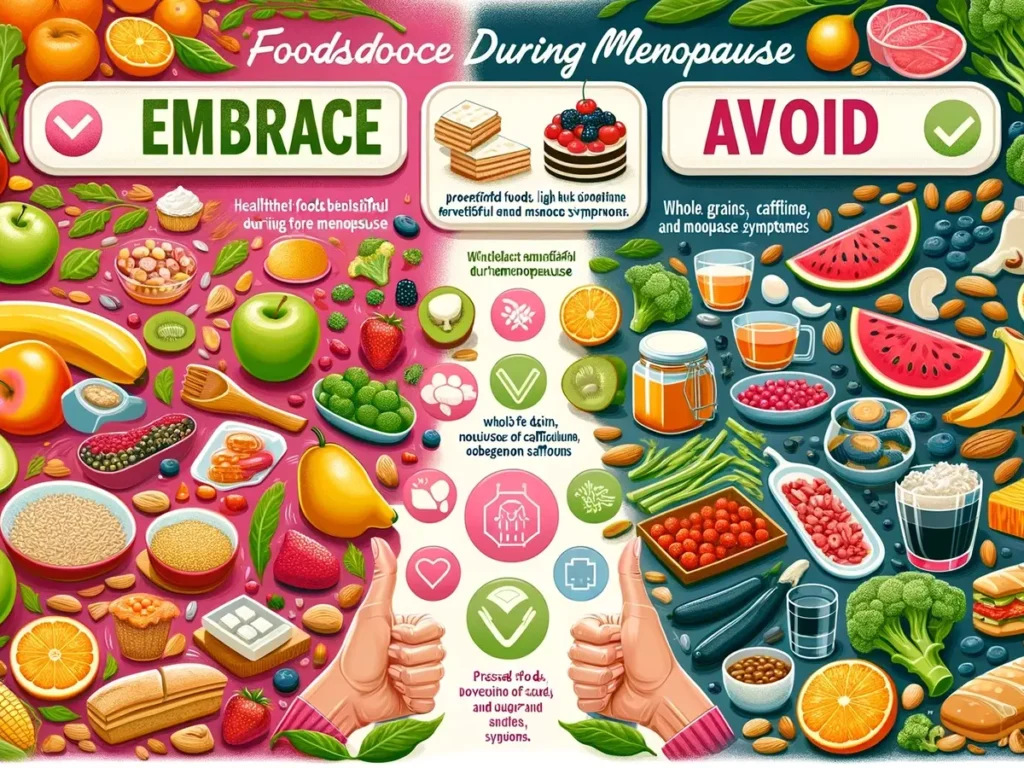Menopause is a natural phase in a woman’s life that marks the end of her reproductive years. While it can bring about various changes and challenges, maintaining a healthy diet can help alleviate some of the symptoms associated with menopause. This blog post will explore the foods to embrace and avoid during this transitional period.
Embracing Nutrient-Rich Foods
During menopause, it’s essential to focus on consuming nutrient-rich foods that support overall health and help manage menopause symptoms. Here are some foods to embrace:
- Fruits and Vegetables: Load up on colourful fruits and vegetables packed with vitamins, minerals, and antioxidants. These can help reduce the risk of heart disease, promote bone health, and manage weight.
- Whole Grains: Choose whole grains like quinoa, brown rice, and whole wheat bread. These provide essential fibre, vitamins, and minerals and can help manage weight and reduce the risk of chronic diseases.
- Healthy Fats: Incorporate sources of healthy fats such as avocados, nuts, seeds, and olive oil. These can help maintain hormone balance, support brain health, and reduce inflammation.
- Lean Proteins: Choose lean protein sources like fish, poultry, tofu, and legumes. These provide essential amino acids for muscle health, support bone density and aid in weight management.
- Calcium-Rich Foods: Bone density decreases during menopause, so it’s crucial to consume calcium-rich foods like dairy products, fortified plant-based milk, and leafy greens. These can help maintain bone health and reduce the risk of osteoporosis.
Avoiding Menopause Triggers
While embracing healthy foods, it’s equally important to avoid specific triggers that can worsen menopause symptoms. Here are some foods to limit or avoid:
- Caffeine and Alcohol: Both caffeine and alcohol can disrupt sleep, trigger hot flashes, and increase irritability. Limiting their consumption can help improve sleep quality and overall well-being.
- Spicy Foods: Spicy foods can exacerbate hot flashes and night sweats. While it’s not necessary to eliminate them, reducing their intake can provide relief from these symptoms.
- Processed and Sugary Foods: Processed foods and those high in added sugars can contribute to weight gain, increase the risk of heart disease, and worsen mood swings. Opt for whole, unprocessed foods whenever possible.
- Saturated and Trans Fats: These unhealthy fats can raise cholesterol levels and increase the risk of heart disease. Limit the consumption of red meat, fried foods, and commercially baked goods.
- Salt: Excessive salt intake can lead to water retention and bloating, which is common during menopause. Be mindful of your salt intake and opt for herbs and spices to flavour your meals instead.
Conclusion
By embracing nutrient-rich foods and avoiding menopause triggers, you can support your overall health and manage the symptoms associated with menopause. Remember, every woman’s experience is unique, so it’s important to listen to your body and make dietary choices that work best for you. Consult a healthcare professional or a registered dietitian for personalized guidance and recommendations.






